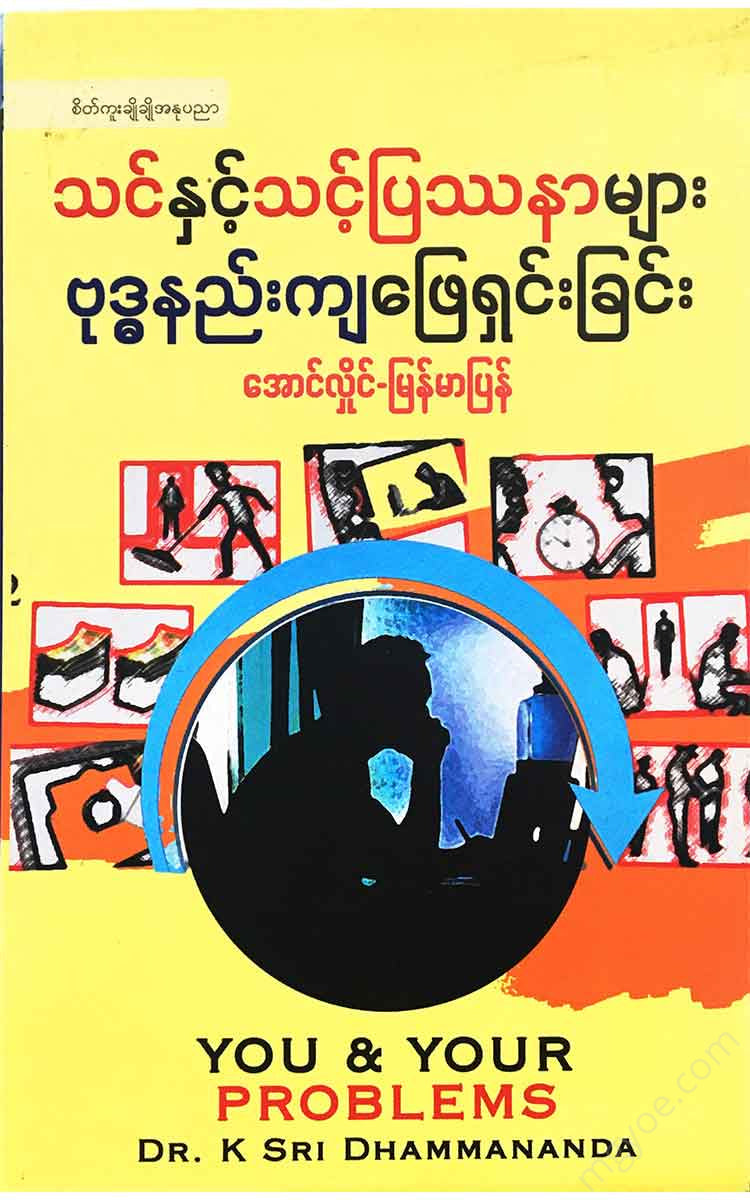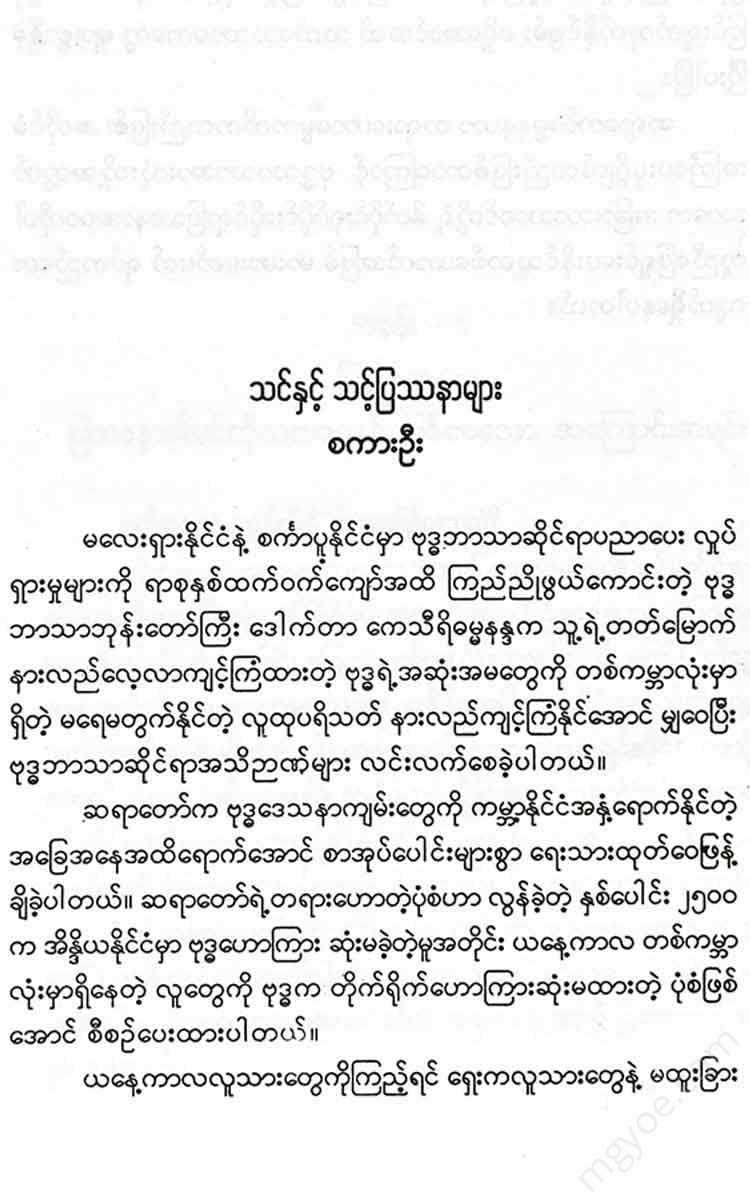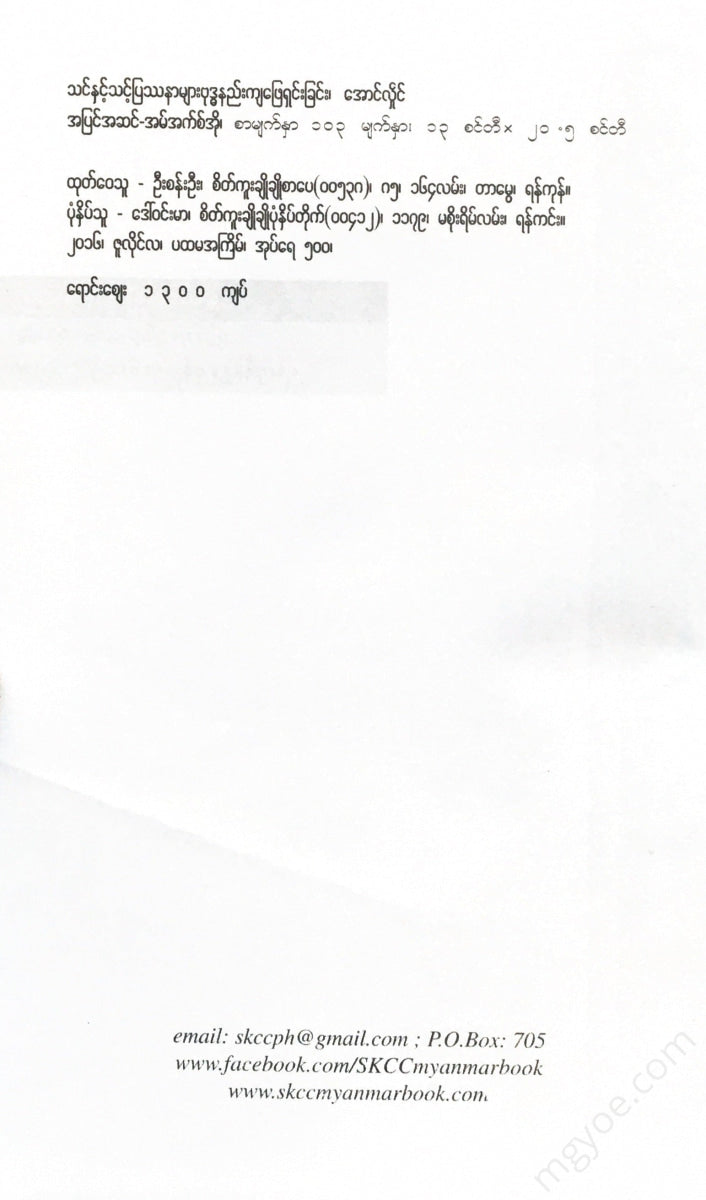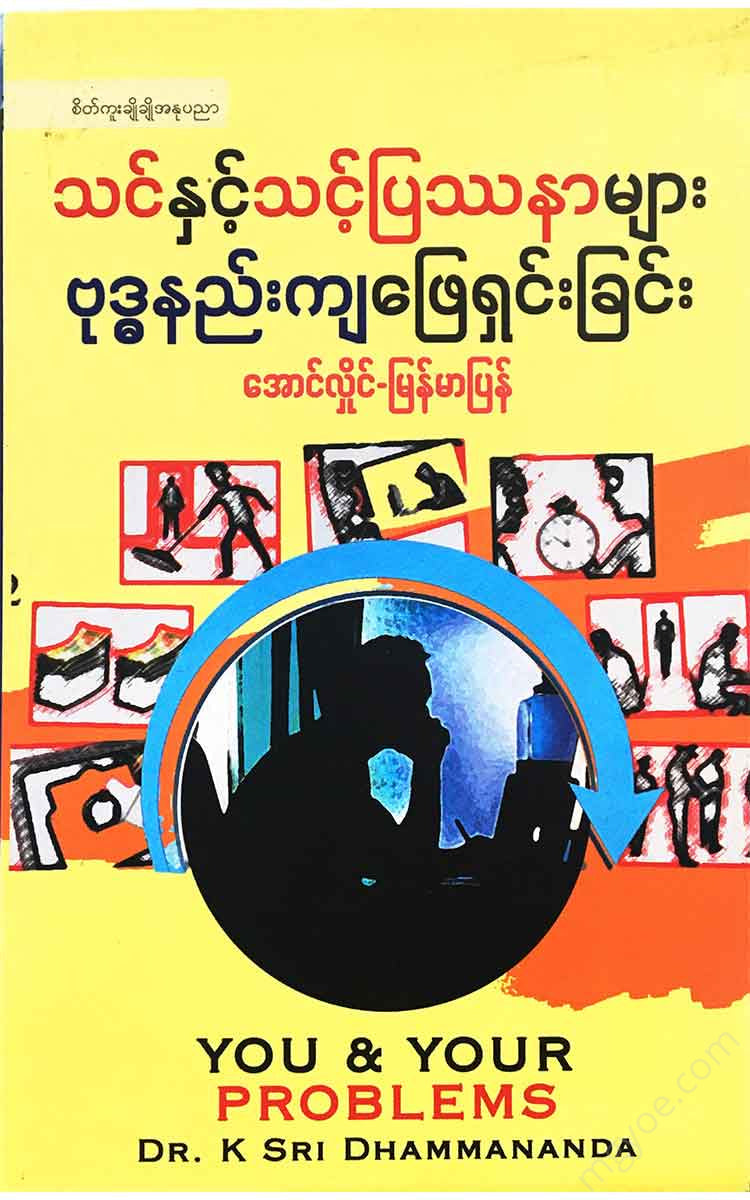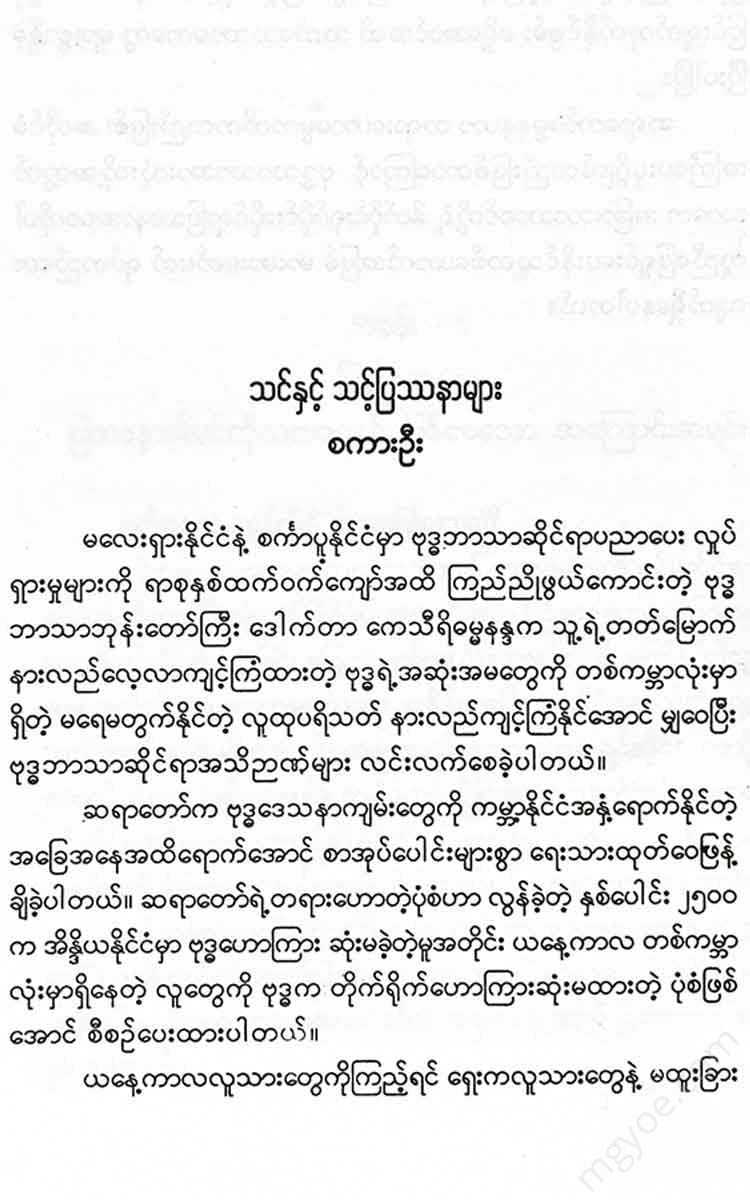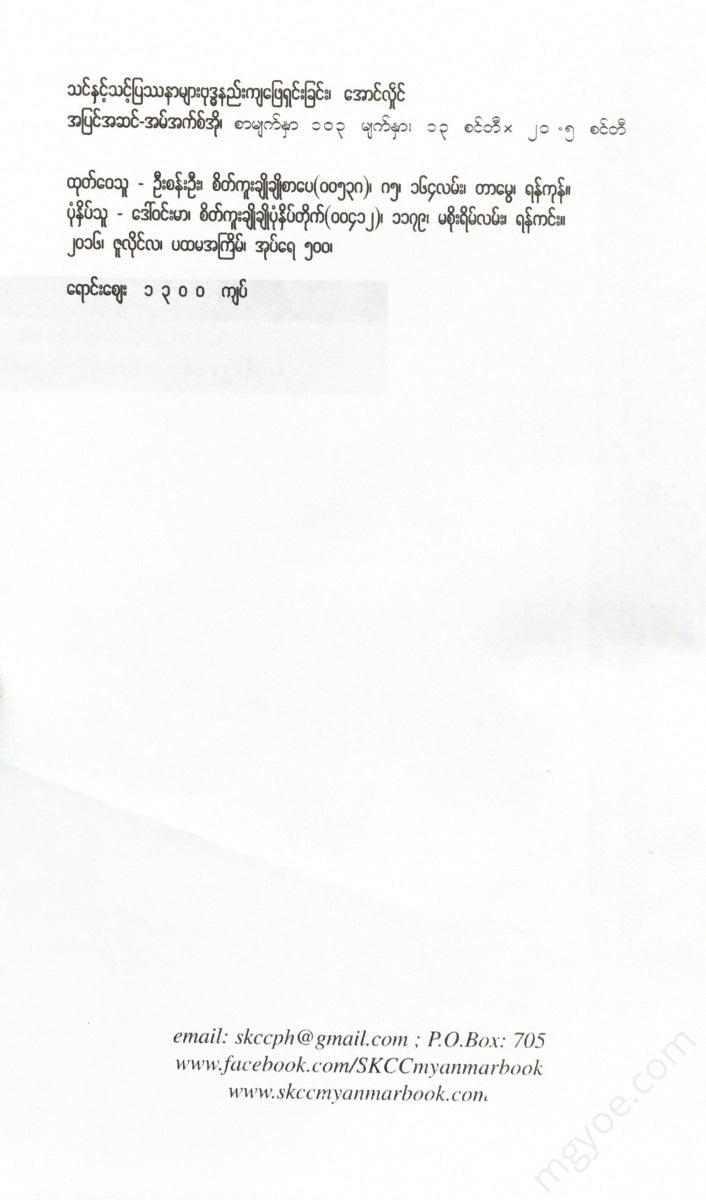စိတ်ကူးချိုချိုစာပေ
Aung Hlaing - You and your problems solved the Buddhist way
Aung Hlaing - You and your problems solved the Buddhist way
Couldn't load pickup availability
Chapter - 1
Problems
The nature and cause of the problem
What is causing us problems ?
It is impossible for any human being to survive in this world without facing problems. Similarly, it is impossible to ignore the problems that we encounter without facing them. From the time we are born to the end of our lives, life is all about facing various problems. If we want to overcome our problems and difficulties, we need to understand the nature of the problem and the root cause. Problems are a guide to help us think carefully about the purpose of our existence and why we find ways to deal with so many problems.
If we create mistakes for ourselves or for everyone, problems will arise and the bigger the problem, the worse the situation will be, from serious conflicts to wars. If no one creates problems and mistakes, and if we try our best to avoid mistakes, there will be no problems in this world.
If we understand the root causes of our individual problems, we can free ourselves from unnecessary fear, anxiety, and feelings of insecurity.
Everyone wants to live a happy and peaceful life. But it's really hard to say to what extent we actually have happiness and peace in our lives.
It is human nature to want to achieve as much happiness as possible, whether it is for a short period of time or for a long period of time.
If we truly understand the secret to long-term happiness, we can achieve lasting happiness throughout our lives.
But we don't know the root cause of the problem, and if we try to solve one problem and create another, it's not easy to get out of the mess. This situation is similar to the situation where a lion is caught in a net and struggles to get out, but the net becomes more complicated and difficult to escape.
If the new problem we accidentally created is only a minor one, we can ease the bad feelings by just being a little patient.
For example, if we have gastritis and are experiencing severe pain, we will need to consult a doctor to get rid of this pain.
If the doctor tells us that we need surgery, we must willingly accept the doctor's advice so that the pain we are experiencing does not get worse.
Another thing to consider is that we have no other choice but to solve the problem.
So, we should happily face the small problem of surgery to completely eliminate the pain and suffering that is so problematic.
What this means is that if one of the two problems is small and solved, the larger problem will disappear, and the smaller problem will be solved with satisfaction.
When undergoing surgery for a disease, think about it this way. Thinking that we are finally successfully eliminating the pain of our gastritis, we should cultivate the mental strength to endure the pain during the surgery, and make up our minds that we will successfully overcome the pain with patience.
If we can train ourselves with this mindset, we will all be able to face the pain that may suddenly arise with a smile on our faces.
Long-standing problems cannot be successfully overcome unless we solve even one or two small problems, or make some emotional or physical sacrifice.
If we are stubborn about the truth, we will accept the truth but not be able to solve problems.
If everyone had patience, or if everyone was free from selfishness, problems would have been avoided, conflicts, hostility, violence, and hatred would have been avoided.
Our Buddha has shown us practical ways to calm down the problems we humans have. He has also taught us to penetrate to the root of the problem, to find the root cause of the problem, and to identify and understand the things that can create it.
According to Buddha, rather than focusing on solving the problem, finding and solving the root cause of the problem is the only way to effectively solve it so that the problem never has a chance to arise again.
For example, when we are sick and feel sick, or when we have a severe headache, the doctor will prescribe medication to relieve the pain we are experiencing. After taking the medication, our pain will subside and we will feel better for a short time, but soon the pain will return. If we study this, we will see that taking medication is an attempt to directly eliminate the problem, and the fact that taking medication will make us feel better and the pain will soon reappear shows that the root cause of the headache problem is not being found or known, and therefore cannot be solved.
Therefore, the doctor must not only prescribe headache medication to relieve the pain, but also continue to investigate and treat what types of diseases the headache is a precursor to.
Another example is that if we have a very painful wound on our body, we will apply medicine or inject it to make it heal. When the wound is better than before, if someone asks us about our wound, we usually answer that it is currently healing well, that it is fine... In fact, we only say that it is currently healing well, and that it is not always painful. If there is a wound on our body and it disappears, another wound can appear at any time. Wounds can occur anywhere in the body.
The sheer size of our bodies creates enormous problems. We all want to focus on our important responsibilities throughout our lives, but the more we focus on our responsibilities, the more we are bombarded with new problems. So anyone who has many responsibilities faces an endless battle of problems.
The method that the Buddha gave us to use is not just a temporary solution to our problems. It is a method that can permanently eradicate the root cause of our problems throughout our lives. That is why some people say that it is so difficult to put the Buddha's teachings into practice.
In fact, the Buddha taught that the problems we face are worldly problems, and only those who have the power to build virtue can significantly escape from them.
Virtue refers to the ability to discipline oneself, to practice and maintain good morals. (We need to practice and practice to maintain good morals.) Wise people, good people, are diligent and diligent in tracing the source of problems. They try to overcome the causes of problems successfully. Therefore, if we want to deal with our problems in the best way possible, as the Buddha taught, we must practice and practice. There is no better way than this. In the days when humans were not guided by the Buddha, no matter what problem they faced, they would approach someone else with trust and seek their advice. Otherwise, they would go to the gods who they believed could solve their problems and pray. They would go to temples and make vows to the gods.
These methods are clearly contrary to the will of the Buddha.
The Buddha asks us to analyze and find the root cause of the problem and provides good methods for its permanent elimination.
Most people who encounter problems tend to blame the other person, unable or unwilling to solve the problem.
This is because they avoid the problem and end up in debt without solving it. Truly honest and virtuous people are willing to openly discuss their problems and seek advice that will help them solve them.
If we point the finger at others, others will point the finger at us. Only when we accept the saying, "Like gives like" can we fully understand the above concept.
Whenever we encounter a problem, we often have doubts in our minds, such as "there is an enemy" or "someone is causing us trouble." At this time, we often look for someone who can give us good advice to eliminate the problems we are experiencing.
In fact, they do not really know that the advice they receive from others is based on their own superstitions. Those who receive such advice often misunderstand the root cause of the problem. As a result of this false belief, they blindly follow the instructions of fortune tellers and psychics. This way of solving problems will lose the main point of how important the root cause of the problem is and will create more and more mistakes. For example, when people fail in their business or are unlucky, they usually resort to magic, occultism, astrology, and fortune telling and do whatever the wise teachers tell them to do. They cannot accept the karmic arrangements of their past lives and therefore focus on achieving good luck and success in the present life.
In this situation, if you openly criticize from a Buddhist perspective, you will be lucky and happy because you are doing the right thing.
There is no guarantee of success. If you do it in advance, you will actually be deceived and will end up wasting your money.
In reality, luck cannot be invented, nor can it be easily achieved. People who possess various kinds of good fortune have done good deeds in previous lives, or their actions have caused various kinds of good fortune, and if they have the opportunity to benefit in the current life, they can achieve various kinds of good fortune and success that are superior to everyone else throughout their lives. In other words, it means the result of karma.
Those who are unlucky or unsuccessful should accept the correct answer that their past karma is the reason for their failure in this life. So there is no need to blame anyone else. As the saying goes, everyone creates their own karma in successive lives. Just as good karma is created by oneself, bad karma cannot be created by anyone except oneself. Similarly, it is completely unacceptable that psychics, astrologers and occultists in this life cannot create good luck for themselves, but they can create good luck for those who trust them.
As long as we cannot ignore the misconceptions and misconceptions that we can create luck and success, we will continue to be misguided in our problem-solving methods throughout our lives.
We cannot simply build better understandings to improve our lifestyles. In fact, religious faith can help us understand and find better ways to solve problems. Therefore, we should not use religion for a moment to achieve success and happiness, but we should constantly practice it to achieve success, happiness, and progress throughout our lives. Those who want to be happy and peaceful must first try to achieve peace.
Human desires are never completely fulfilled in fulfilling their physical needs. It is important to note that desires are always new, even when we are about to give up our lives.
The desires that humans always have and always will be are how to make more money. How to enjoy the senses. How to live a life of complete luxury. How to fulfill one's own interests and desires without even considering the impact on the lives of others.
In fact, these pleasures are not meant to last a lifetime, but rather to be enjoyed for a short time.
